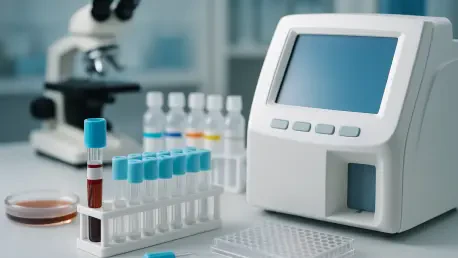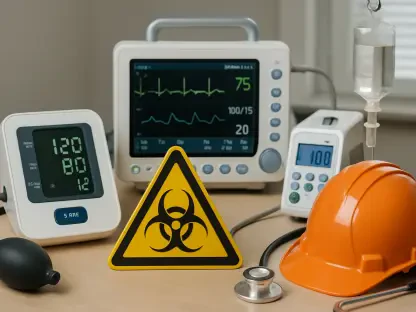The global In-Vitro Diagnostics (IVD) contract manufacturing services market is witnessing an unprecedented surge, with experts forecasting a striking growth rate of approximately 11% CAGR from now through 2030. IVD involves diagnostic tests conducted on biological samples such as blood or tissue to identify diseases, monitor health conditions, and inform treatment strategies. Contract manufacturing, often managed by specialized entities known as Contract Development and Manufacturing Organizations (CDMOs), provides critical support to Original Equipment Manufacturers (OEMs) by handling production, assay development, and other technical services. This sector is fundamentally transforming healthcare by enabling faster, more accessible diagnostic solutions that address pressing global needs. As the burden of diseases mounts and technological advancements accelerate, the reliance on contract manufacturing intensifies, positioning it as a cornerstone of modern diagnostics and a key player in meeting market demands with efficiency and innovation.
The Push for Point-of-Care Testing Solutions
The escalating demand for point-of-care (POC) testing stands out as a primary force propelling the IVD contract manufacturing market forward. POC diagnostics allow testing to occur directly at or near the patient’s location—be it in hospitals, clinics, or even at home—delivering rapid results that facilitate immediate health decisions. This shift toward decentralized testing responds to the urgent need for quicker, more accessible medical insights, particularly in critical care scenarios. However, producing POC devices presents unique hurdles, including the requirement for high-precision components and the delicate management of reagents and fluids. CDMOs emerge as indispensable allies in this context, offering the specialized expertise and infrastructure necessary to overcome these manufacturing challenges. Their role ensures that OEMs can bring innovative POC solutions to market efficiently, meeting the growing expectations of healthcare providers and patients alike while maintaining stringent quality standards.
Another dimension of the POC testing surge lies in its alignment with broader healthcare trends toward patient-centric care. As populations age and chronic conditions become more prevalent, the ability to conduct diagnostics outside traditional laboratory settings becomes increasingly vital. Contract manufacturers play a pivotal role by scaling production to match this rising demand, often incorporating cutting-edge technologies to enhance device functionality. Their capacity to adapt to complex design requirements and ensure regulatory compliance allows OEMs to focus on innovation rather than operational bottlenecks. This synergy not only accelerates the deployment of POC tools but also supports the global push for more responsive and personalized medical interventions. The result is a dynamic market where contract manufacturing acts as a catalyst, enabling the healthcare industry to keep pace with evolving patient needs and technological possibilities.
Economic Benefits and Strategic Outsourcing
One of the most compelling reasons behind the boom in IVD contract manufacturing is the substantial cost savings and operational efficiencies it offers to OEMs. By partnering with CDMOs, companies can achieve economies of scale, significantly reducing expenses related to labor, automation, and infrastructure. This financial advantage allows OEMs to redirect resources toward core activities such as research and product innovation, rather than getting mired in the complexities of production. Beyond cost, outsourcing provides scalability, enabling firms to ramp up or scale down manufacturing based on market demand without the burden of maintaining extensive in-house facilities. Additionally, CDMOs often bring a wealth of experience in navigating regulatory landscapes and managing supply chain risks, a factor that has gained importance in the wake of global disruptions like the COVID-19 pandemic, ensuring smoother operations for their partners.
Strategically, the decision to outsource manufacturing reflects a deeper shift in the diagnostics industry toward specialization and collaboration. High-profile partnerships, such as the recent alliance between Akoya Biosciences and Argonaut Manufacturing Services, illustrate how CDMOs enable OEMs to expedite product development and market entry. These collaborations leverage the complementary strengths of both parties, with contract manufacturers providing technical prowess and OEMs focusing on design and branding. This model not only mitigates risks associated with production delays or quality issues but also fosters innovation by allowing companies to tap into a broader pool of expertise. As the IVD market becomes increasingly competitive, the strategic advantages of outsourcing to CDMOs are becoming a necessity rather than a mere option, positioning contract manufacturing as a linchpin in the quest for efficiency and market responsiveness.
Disease Burden as a Market Catalyst
The rising global incidence of chronic and infectious diseases serves as a powerful driver for the IVD contract manufacturing sector. Conditions like cancer and various infections require early detection, accurate staging, and tailored treatment plans, all of which depend heavily on sophisticated diagnostic tests. As healthcare systems worldwide grapple with an escalating disease burden, the demand for reliable IVD solutions continues to soar, placing immense pressure on OEMs to deliver at scale. Contract manufacturers step in to bridge this gap, offering the production capacity and technical know-how needed to ensure a steady supply of diagnostic tools. Their ability to maintain high standards of quality while meeting urgent market needs makes them critical partners in addressing global health challenges, ultimately improving patient outcomes through timely and accurate diagnostics.
Beyond the immediate need for diagnostics, the growing prevalence of diseases underscores the importance of innovation in testing methodologies. IVD tests are not just tools for detection but also vital for monitoring disease progression and evaluating treatment efficacy, which are essential in managing long-term health conditions. Contract manufacturers support this by enabling OEMs to produce a diverse range of testing solutions, from molecular diagnostics to immunoassays, tailored to specific medical requirements. This adaptability ensures that healthcare providers have access to the latest diagnostic technologies, even as disease patterns evolve. The reliance on CDMOs to handle the complexities of manufacturing these advanced tools highlights their indispensable role in sustaining the momentum of the IVD market, particularly in regions with high disease incidence and limited local production capabilities.
Government Policies and Post-Pandemic Recovery
Government support has emerged as a significant accelerator for the IVD contract manufacturing market, particularly in the aftermath of the COVID-19 crisis. Policies aimed at enhancing the production of diagnostic kits have spotlighted the critical role of IVD in public health preparedness, prompting increased investments in manufacturing infrastructure. Many governments have rolled out incentives and funding to bolster local and global diagnostic capacities, recognizing that rapid testing is a cornerstone of effective disease management. These initiatives have encouraged stronger partnerships with CDMOs, as OEMs seek to align with enhanced regulatory frameworks and capitalize on public sector backing. The result is a more robust market environment where contract manufacturing can thrive, supported by a clear commitment to strengthening healthcare systems against future crises.
The post-pandemic landscape has also reshaped priorities within the diagnostics industry, with a renewed focus on resilience and rapid response capabilities. The unprecedented demand for testing during the COVID-19 outbreak exposed vulnerabilities in global supply chains, prompting a reevaluation of manufacturing strategies. Contract manufacturers have become central to this shift, offering the flexibility and expertise needed to prevent disruptions and ensure continuity of supply. Their role in supporting government-led efforts to stockpile diagnostic resources and expand testing access has further solidified their importance. As nations continue to rebuild and fortify their health infrastructures, the collaboration between public entities and CDMOs is likely to deepen, fostering a market that is better equipped to handle both current demands and unforeseen health emergencies with agility and precision.
Market Trends and Competitive Forces
A defining trend in the IVD contract manufacturing space is the transformation of outsourcing from a cost-saving tactic to a strategic imperative for OEMs aiming to maintain a competitive edge. The move toward POC testing mirrors a broader industry pivot to patient-centered healthcare, necessitating advanced manufacturing capabilities that many companies lack internally. This gap is adeptly filled by CDMOs, whose expertise in high-tech production processes allows for the rapid development and deployment of innovative diagnostics. The trend is further amplified by increasing collaborations between industry players, as seen in strategic partnerships that combine technical strengths to accelerate market entry. Such dynamics underscore how contract manufacturing is not just supporting but actively shaping the future of diagnostics through adaptability and innovation.
The competitive landscape of this market is equally noteworthy, with major players like Jabil Inc., Thermo Fisher Scientific, and others driving progress through strategic expansions and partnerships. These companies differentiate themselves by investing in cutting-edge manufacturing technologies and addressing complex design challenges, which are crucial in a field as intricate as IVD. Competition fosters a culture of continuous improvement, pushing CDMOs to refine processes and offer tailored solutions that meet the diverse needs of OEMs across different regions and technologies. As the market evolves, the ability to innovate and form synergistic alliances will remain a key determinant of success. This vibrant, competitive environment ensures that the IVD contract manufacturing sector remains at the forefront of healthcare advancements, poised for sustained growth and impact.
Shaping the Future of Diagnostics
Reflecting on the trajectory of the IVD contract manufacturing market, it becomes evident that its expansion is fueled by a confluence of urgent healthcare needs, technological strides, and strategic partnerships. The emphasis on point-of-care testing has reshaped access to diagnostics, while the escalating burden of diseases underscores the necessity of scalable solutions. Cost efficiencies and government support have played crucial roles in solidifying the reliance on CDMOs, as has the competitive drive among industry leaders to innovate. Looking ahead, stakeholders must prioritize selecting manufacturing partners with robust technical and regulatory expertise to navigate ongoing challenges. Investment in advanced production technologies and deeper collaborations will be essential to sustain momentum. As the market continues to evolve, focusing on tailored strategies across regions and technologies will ensure that the IVD sector remains a vital pillar of global health, ready to address emerging demands with precision and foresight.









